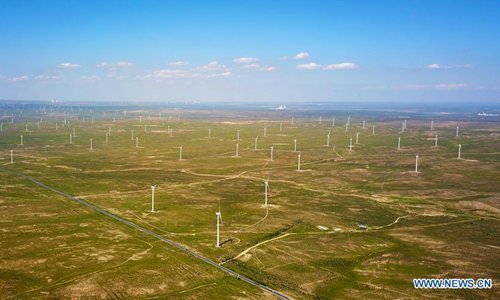
Aerial photo taken on Aug. 24, 2018 shows the Taiyangshan wind power station in the city of Wuzhong, northwest China's Ningxia Hui Autonomous Region. (Photo: Agencies)
Only massive investment in clean energy can help overcome the economic crisis caused by the novel coronavirus pandemic while setting the world on a path to meeting its objectives to slow climate change, the International Energy Agency (IEA) said Tuesday.
In its annual report looking into energy markets in the decades to come, the IEA presents several scenarios as governments try to balance the health of their citizens and their economies.
For the first time, the World Energy Outlook report includes a pathway that would see the world achieve carbon neutrality in 2050.
That is an objective some governments have already set themselves and one that would help ensure the rise in global temperatures is contained to well below 2 C, the bedrock target of the 2015 Paris Agreement.
While the world economy has taken a knock, it will only provide a temporary drop in emissions unless policies change sharply, the IEA warned.
"Despite a record drop in global emissions this year, the world is far from doing enough to put them into decisive decline," said IEA's Executive Director, Fatih Birol.
"The economic downturn has temporarily suppressed emissions," he added.
The IEA estimates energy-related CO2 emissions will fall by 7 percent in 2020.
However, as governments contemplate additional economic stimulus, they could advance their climate objectives by directing investment into clean energy.
"A step-change in clean energy investment, in line with the IEA Sustainable Recovery Plan, offers a way to boost economic recovery, create jobs and reduce emissions," said the IEA.
Earlier in 2020, the IEA along with the IMF presented a blueprint for governments to use environmental spending to create jobs and spur economic recovery.
It calls for additional investment of $1 trillion a year for the next three years toward improvements in energy efficiency, low-carbon power and electricity grids, and more sustainable fuels.
Such an effort would have an immediate impact on the trajectory of emissions, making "2019 the definitive peak for global CO2 emissions."
Moving onto what the IEA calls its sustainable development scenario results in "cleaner air than during the 2020 lockdowns... without the disruptions to economic activity or people's lives."
However, it warned that adding renewable power sources to the electricity grid will not be enough, with existing industry needing to reduce its carbon footprint.


